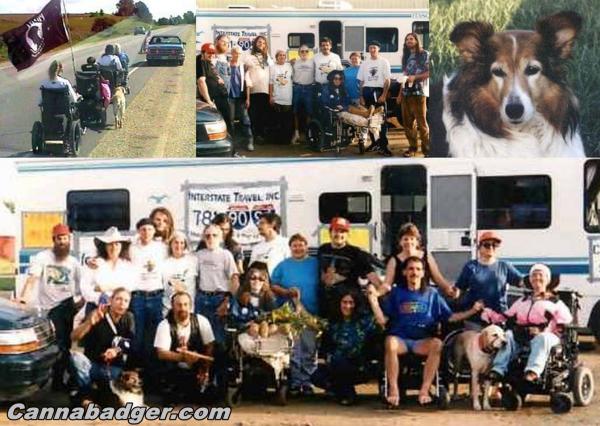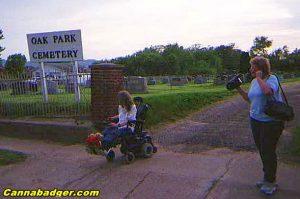The 1997 Wisconsin Journey for Justice was a pivotal event in medical cannabis advocacy both for Wisconsin and myself personally. Sept. 11-18, 2017 is the 20th anniversary of the week Wisconsin medical cannabis pioneer Jacki Rickert, joined by 15 medical cannabis patients along with supporters, departed her home in Mondovi to undertake a week long wheelchair Journey for Justice ending at the Wisconsin Capitol in Madison.
Jacki Rickert visits the grave of her late physician Dr. William E. Wright at Oak Park Cemetery in Mondovi WI. Dr. Wright's grave was the first stop before the wheelchair march departed for Madison, (Cannabadger.com)
A 1997 article in the Eau Claire Leader Telegram described how the Journey began with a vigil at Mondovi's Oak Park Cemetery, in tribute to Jacki's late physician, Dr. William E. Wright. Dr. Wright, who died in 1993, was able to get Jacki approved for the federal Compassionate IND medical cannabis program, although ultimately federal authorities reneged and never supplied her with federal marijuana supplies. In Aug. 2015, Cannabadger looked at Jacki's 1992 meeting with former President Bill Clinton and his br4oken promise to make it right if elected.
As she prepared to begin her "Journey for Justice" on Sept. 11, 1997, Jacki Rickert told the Leader-Telegram the journey would not really end until people get the marijuana medication they're entitled to, saying, "We're just ordinary people trying to do an extraordinary thing."
The video below, which includes clips from newscasts as well as the journey, shows how the wheelchair marchers proceeded through all kinds of weather to reach the Capitol in Madison.
Patients participating in the Wisconsin Journey for Justice came from as far away as Ohio, Texas and Florida. The entourage included 15 patients, three caregivers, drivers and helpers. The late Kay Lee, who also organized Journeys for Justice in Ohio and Florida helped coordinate. NORML was a supporter both financially and in publicizing the event.
The week-long 210 mile trek to Madison, culminated on Sept. 18 at the Capitol with the introduction of 1997 AB 560, sponsored by then-State Reps. Frank Boyle (D-Phillips) and Tammy Baldwin (D-Madison).
As the Journey unfolded, I was back in Madison following it on the web. I had an aortic valve replacement in August 1997, but a post-operative staph infection 10 days after my discharge had me re-hospitalized for 2 more weeks, with multiple surgeries and hooked to a morphine pump. There were times I wondered if I'd ever get out of the hospital, but thanks to some "cannabis angels," I survived. It was a long recovery and I was very weak. A nurse came to my apartment daily to check the wound for weeks.
But despite the slow pace of my recuperation I was determined to be at the Capitol on the State St. steps on Sept. 18 when the 15 wheelchairs, led by Jacki with her devoted canine companion sheltie Bones, arrived. While waiting I met George McMahon, one of the federal patients in the IND program. I met a bunch of great folks that day, some no longer with us including Florida patient Joe Hart, a Vietnam war vet.
It was the firs time I met Jacki Rickert, who accidentally rolled over my foot in her wheelchair, making my foot part of the journey, I guess. A large group of us met with aides to then Gov. Tommy Thompson in the governor's ornate conference room adjacent to the governor's office. It was the first time I saw the inscription on the wall that reads, "The will of the people is the law of the land."
But the will of the people was not done. As far as I can tell, the bill only got two sponsors, Boyle and Baldwin. But it was a beginning. I often wonder what might have happened if instead of rejecting it, Wisconsin had embraced it. We'd be a leader in the cannabis industry now.
As seen in the above video, longtime Assembly Health Committee chair Rep. Gregg Underheim (R-Oshkosh) basically called the Journey participants a bunch of hippies in response to the bill in 1997. But in 2003, after Jim Miller and I had a very nice discussion with one of his aides, I was summoned back for a meeting. After a bout with cancer, Underheim had changed his mind. He sponsored bills in two sessions 2003 and 2005, even holding a public hearing in Nov. 2005.
While I could have never predicted Wisconsin patients would still be twisting in the wind waiting for lawmakers to do the right thing 20 years after the Journey for Justice, cannabis activism has come a long way in the state in those 20 years. But nothing of it's scale has been attempted since. Jacki Rickert and other medical cannabis pioneers who pulled together and pulled it off deserve our gratitude.


